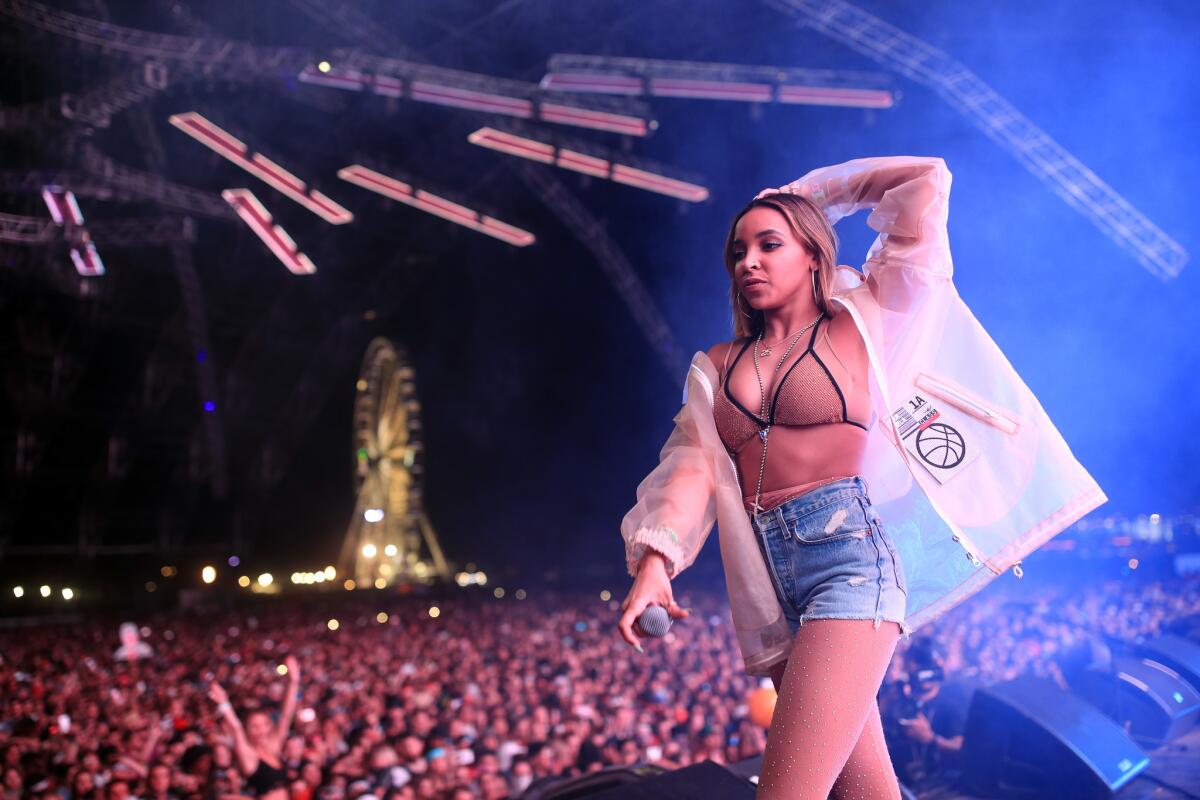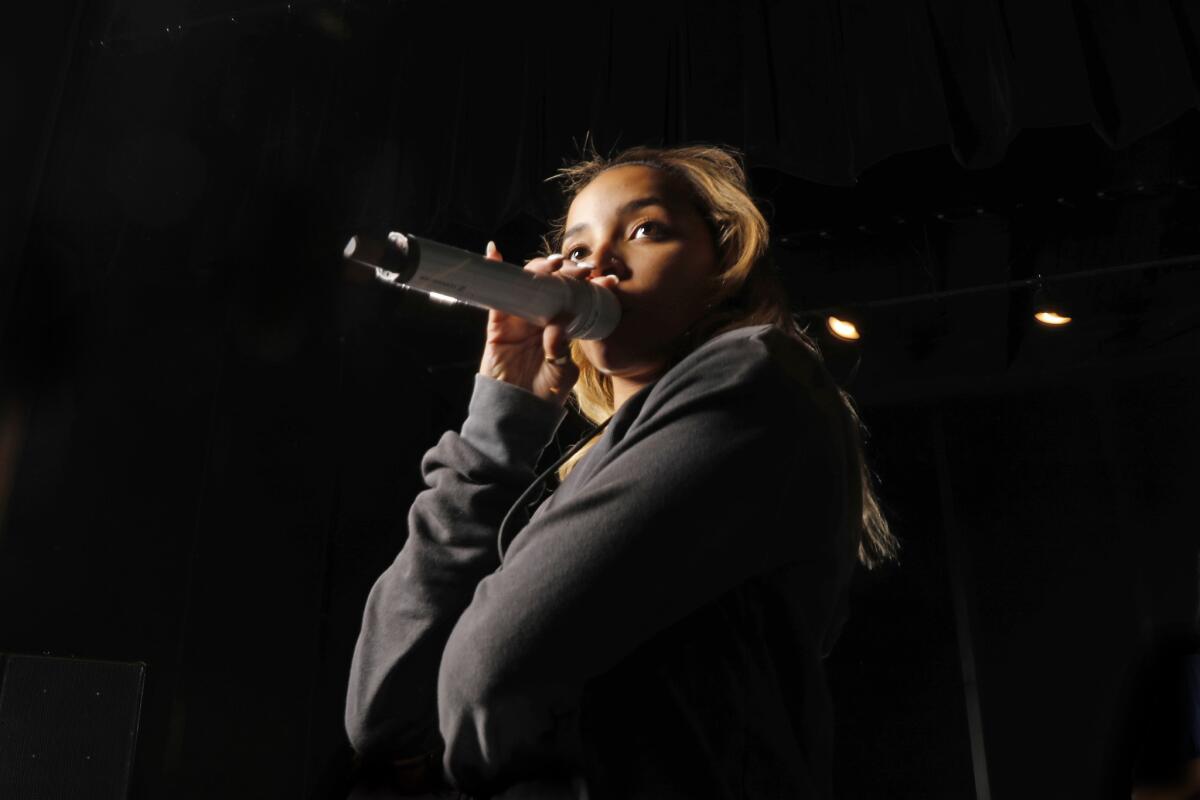Q&A: Tinashe’s steadfast journey to ‘Joyride’ shows the rigors of pop stardom
Tinashe’s black Ferrari California-T lets out a “purr” as she accelerates through Angeles National Forest.
She really wanted to put the top down, but it’s chilly enough that she circles back into the house to grab a thick sweatshirt.
It’s the one off day that the multi-hyphenated artist has had in months, and we are zooming along a route she takes near the La Crescenta home she grew up in whenever she’s in search of solitude.
“There’s no cell service, and I can be alone with my thoughts — and the music,” she says.
The night before the 25-year-old turned in the final mix of “Joyride” to her label RCA, but she’s using the day to drive through the mountains to listen for things she might have missed — technical stuff like timing and track transitions that the casual listener wouldn’t know.
“It’s all about the details,” she notes, cranking up the volume on silky, slow burner “He Don’t Want It,” one of the standouts on her long-delayed sophomore record. “I’m not [messing] around. I’ve waited years for this.”
These winding roads beneath the Verdugo Mountains might be the perfect place to detach from the hustle of Los Angeles, but they also provide an apt metaphor for Tinashe’s long, bumpy journey toward “Joyride.”
If the singer-songwriter-producer born Tinashe Jorgensen Kachingwe had had it her way, the album would have been out years ago, continuing momentum on a young career that on paper appeared ascending toward pop stardom.
Four years ago she debuted with the DJ Mustard-produced earworm “2 On,” a hypnotic club banger that dominated radio during the summer of its release.
A stark departure from the kaleidoscopes of downtempo, alternative R&B and dreamy pop she weaved on DIY mixtapes produced and recorded in her bedroom that caught the attention of major labels, “2 On” — along with 2014 debut “Aquarius” — announced the arrival of Tinashe as the next big thing in pop-R&B.
Tours with Nicki Minaj and Katy Perry, collaborations with Britney Spears, Nick Jonas and Ty Dolla Sign, praise from idol Janet Jackson and the release of a shimmering bonus collection (2015’s “Amethyst”) all built her buzz and less than a year after her debut work began on “Joyride.”
And that’s when things got tough.

The album turned out the way I envisioned it. To even have a sophomore album is a huge chance — for any artist.
— Tinashe on the three year journey to "Joyride"
A string of genre-hopping singles showcased the singer-songwriter’s versatility but failed to heat up radio. She butted heads with her label over creative direction, and “Joyride” was delayed several times as she attempted a restart.
Tinashe voiced her frustrations with a candor typically unseen in pop stars — like the time she admonished her label for prioritizing Zayn Malik’s solo debut over hers or when she leaked her own single and self-funded music videos or coming clean about working with embattled R&B singer Chris Brown (“It was really the label … It wasn't me”) or the time she had to buy back her album’s titular track after Rihanna snagged it for “Anti.”
She attempted to speed things along, experimenting with tracks that the label encouraged her to record and releasing a full-length project in late 2016 called “Nightride.” It was packed with the seductive, laid-back tracks she had been crafting during sessions for “Joyride.” Though met with widespread acclaim, “Nightride” didn’t shift her project forward the way she had hoped.
"Critical acclaim hasn't been enough in my experience. The label appreciates it, but the music business, in my perspective, is still so much based on revenue and how much they are making in sales. That's where it gets really [crappy],” she told The Times last summer in an interview detailing her hurdles.
“I always feel like an underdog, like I had something to prove,” she says of her position in the industry.
Feeling counted out has only fueled her. She’s certainly seen the comments on social media calling her a “flop,” and she’s read all the thinkpieces about why her career hasn’t taken off. “I’ve already felt all of the emotions. At this point … the music pretty much speaks for itself.”
It’s why the first offering from “Joyride” serves as a cheeky opening statement to the narrative that’s surrounded her. “Said I’m fallin’ off, but they won’t JFK me / Tried to be myself, but they won’t AKA me / AKA a popstar AKA a problem / AKA don’t hold me back, I swear I got ’em,” she sings over a sinister beat. The song is called, ironically, “No Drama.”
Released in April, nearly three years after it was originally announced, “Joyride” showcases the singer’s knack for versatility. One moment she’s delivering slinky, future-R&B, the next she’s riding electro-dance beats or downtempo alternative productions.
A few weeks after our road trip, we meet at a quiet West Hollywood lounge. Tinashe is on the first leg of promotion for the album and has yet to pack for a red-eye to New York, where she has a string of performances before she gets a few days to relax with her boyfriend.
She’s had a full day of promo stops, and she could use something much stronger than the lemonade the singer is nursing. For a performer who has felt they’d had as much to prove as Tinashe has, she’s surprisingly calm when discussing the album. “I’m ready to get out there and perform.”

It felt like this album was never coming out.
It still hasn't fully sunken in, I don't think. [But] it’s a way better feeling than releases in the past. The album turned out the way I envisioned it. To even have a sophomore album is a huge chance — for any artist. I'm appreciative of all the time that it took.
Have you felt any pressure about the album’s performance?
At this point, everything will be as it will be. I've done already what I needed to do. I’ve done the work. So it's like just let the universe take control, you know?
There have been many versions of “Joyride.” When did the final one take shape?
Last summer. I got a house in the hills and built a studio. I needed to take it upon myself to make sure that the project got on track. I needed a place where I could hone in on it creatively and pinpoint all the different elements that I thought we already had or that we were missing.
It was a real important part of the process. A turning point, for sure. I had a really great time there. It was such a vibe, and we had a great creative energy. Every day we were just having fun, going out, making music, being creative.
You put out a lot of music that didn’t make the album.
I'm always eager to get new material out there. Probably to a fault, sometimes. I always want there to be the next thing. Sometimes it was just throwing something out there to test it. And, yeah, there were creative discrepancies within my label. Hiccups and minor things that we disagreed upon throughout the process.
Because [recording] was so fragmented and I was working with different people all over, my thoughts were a little discombobulated creatively. But once I got focused and got more in control I was able to have a better understanding of my vision.
How many songs did you ultimately record?
We did three solid months of recording every day over the summer. We did at least 50 songs. And before that, we were already over 100 deep.
You’ve been candid about your position in the industry, to much criticism.
It's hard to express your true feelings and not to come across the wrong way, like you’re whiny or ungrateful. I’m very blessed to have all of the things that I have accomplished. But at the same time, I think it's also important to have open conversations about how I feel, what's my position in the industry. I'm not the only artist who feels some of the same ways that I feel about certain issues, so I think it's just important to keep having those conversations.
We’ve talked at length about how women, specifically women of color, are treated in the music industry. In this era of #MeToo and Time’s Up, have you noticed a difference?
Finally more people are talking. I see changes happening, slowly but surely. We have a long way to go. It starts with changing the attitude towards female artists. That competitive mentality that surrounds us isn’t placed on men as much.
What’s the takeaway from “Joyride”?
All these different sides of me – I own all of them. The project is where I feel like I am. And I feel really good about it. There’s a big sense of calm ... it was a long time coming. It’s nice to finally be able to put a lid on that. The misconceptions about me are pretty apparent, so I want people to listen to the music and take it for what it is. Just enjoy the body of work.
For more music news follow me on Twitter:@GerrickKennedy
The biggest entertainment stories
Get our big stories about Hollywood, film, television, music, arts, culture and more right in your inbox as soon as they publish.
You may occasionally receive promotional content from the Los Angeles Times.








